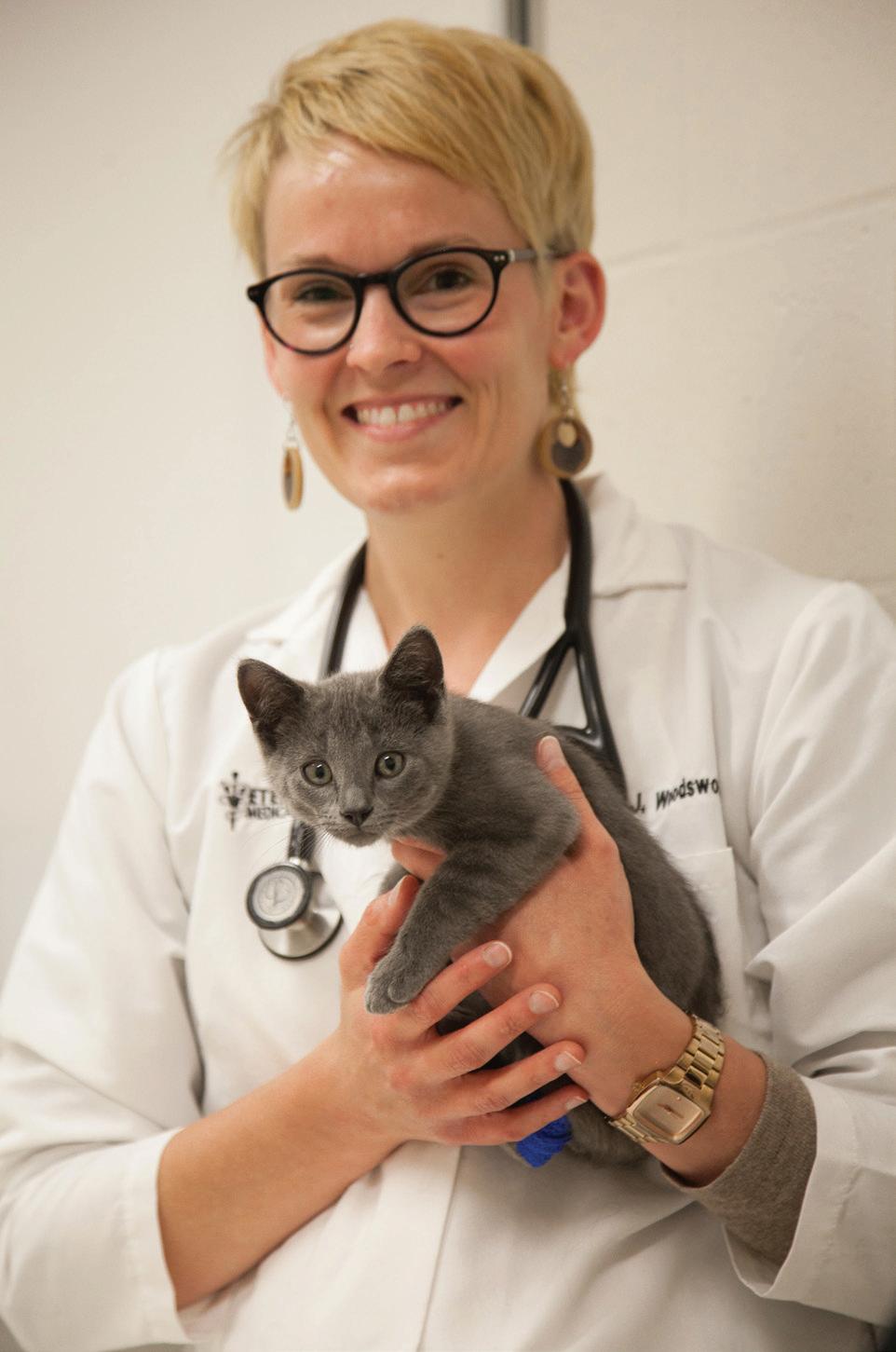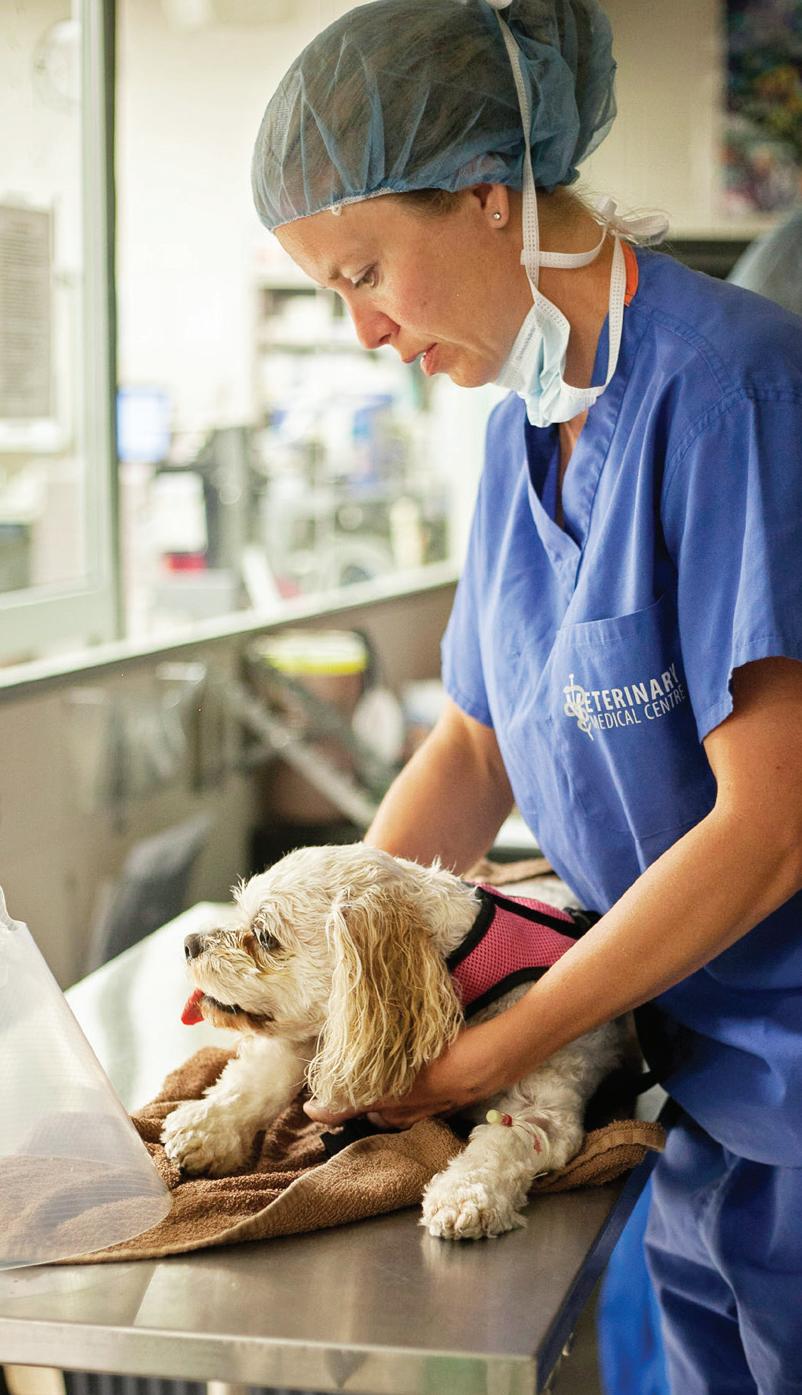
6 minute read
Vaccines provide pets with wide range of benefits
Vaccines provide pets
with wide range of benefits
Advertisement
BY WENDY LIVINGSTONE
Since the global pandemic began more than a year ago, we have all become much more knowledgeable about communicable diseases in general and ways that we can prevent their transmission. One important message conveyed by healthcare experts is that vaccines do not necessarily completely prevent disease but are vital in mitigating its consequences. The same is true when we vaccinate our four-legged family members.
“Vaccines do a very good job of protecting animals from severe illness, but not in all cases are we completely preventing infection,” says Dr. Jordan Woodsworth, clinical associate veterinarian in Wellness and Preventive Medicine at the Western College of Veterinary Medicine (WCVM), University of Saskatchewan. “In a lot of cases, we vaccinate to reduce severity of disease and reduce shedding of that pathogen. So, vaccination is a way to protect not only individual animals but also the larger animal population in the community.” CATS
DOGS
timely fashion.” important. If animals are actively shedding Parvovirus lives in the environment and the virus in their saliva, humans and wildlife is very hardy. “If a dog came through, say, can be infected through a bite. The disease a (boarding) kennel and had parvo, was can be fatal to both. “That’s why we really shedding it, and the area was not properly advise that everyone have their animals disinfected, that could be spread to dogs vaccinated against rabies,” says Woodsworth. Distemper can also infect a wide variety of wildlife species. “Distemper virus can be transmitted to coyotes, foxes, bears, racoons, weasels and a lot of other species, and that could cause damage to their wild population,” she says. Vaccines recommended for our feline friends include feline panleukopenia, which is closely related to canine parvovirus, feline calicivirus, feline herpes, rabies and feline leukemia virus. Woodsworth advises against allowing cats to wander free. The City of Saskatoon has a bylaw in place that forbids cats and dogs from roaming outdoors. Cats that wander face a much higher danger of encountering viruses such as feline leukemia virus and feline immunodeficiency virus. They may not show any symptoms until years later but can still spread the virus to cats with whom they
Veterinarians recommend that share space or fight. There is no dogs be vaccinated against canine effective vaccination for feline parvovirus, canine distemper, immunodeficiency virus. canine adenovirus, rabies and in As with humans, vaccinations some animals, Bordetella, often “Vaccination is a way to protect not only individual animals but for animals sometimes cause side referred to as kennel cough. also the larger animal population in the community,” says Dr. effects such as soreness at the site of
Parvo is primarily a Jordan Woodsworth, Western College of Veterinary Medicine. the vaccination, tiredness and loss gastrointestinal illness with (PHOTO: CHRISTINA WEESE) of appetite. symptoms that include vomiting Woodsworth says the benefits of and diarrhea, which can be vaccines for individual pets and for bloody. In some cases, the animals require that come the next day, a week later or three the community far outweigh the risks. “They emergency care. months later. So it’s really important when do a very good job of protecting animals from
“If animals don’t receive treatment, they people are taking their animals out that they illness and from severe illness and protecting are at risk of dying,” says Woodsworth, make sure they are up to date on vaccines,” the population; it’s uncommon for us to have “but we have pretty darned good success if says Woodsworth. reactions that are problematic,” she says. animals get the treatment that they need in a Protection against rabies is equally Pet owners could also save significant
dollars by vaccinating their animals. “The cost of vaccinating an animal is going to be vastly less than the cost of treating an illness,” says Woodsworth. “An average primary healthcare or well-care visit for a cat or a dog is going to be in the range of a few hundred dollars, depending on the clinic and what that animal needs, whereas, if we are talking about treatment for, say, parvovirus, we are talking in the thousands, without a guaranteed outcome. And the costs can be both monetary and emotional.
“If we want to feel free, safe, and entitled to take our animal for a walk in the neighbourhood, to the dog park or to the groomer, I think it’s part of our social responsibility to make sure they are protected so they are also protecting the animals that they may come into contact with,” says Woodsworth.
WHEN TO VACCINATE?
“For puppies and kittens, typically we recommend that they are vaccinated starting as early as six to eight weeks and then be revaccinated every three to four weeks until they are between 12 and 16 weeks of age. The date and timing of the last vaccination in the puppy says. “It should be used as long as it is needed. In some cases, medication could be needed for life, but the hope is that the animal can be weaned off medication at some point.”
Machin says the downside to not treating a pet, especially when signs are severe, is that the behaviour can threaten the human-animal bond, resulting the animal being surrendered or the owner turning to euthanasia for the pet.
“The earlier the animal is treated, the better the chances that the pet has to recover,” Machin says. “If there are signs of separation distress, it is better to deal with them as soon as possible.”
or kitten series is the most important because that’s when we are going to know they have responded to that vaccine. They can get rabies vaccines at or after 12 weeks of age, and all of those vaccines need to be boostered a year later. And then, depending on the vaccine, we typically give a re-booster every one to three years depending on the vaccine,” says Woodsworth.
“With senior animals, their immune systems are less robust and less functional, so they are a little less capable of fighting off infection when they come in contact with some of these viruses. So it’s just as important for us to stay on top of vaccination when animals get into their senior and geriatric years.”
For more information on pet vaccines, contact a veterinarian.
Heading back to the office soon? Here’s how to help your pet deal with anxiety separation
24/7 Connected to your community
FOR OVER 50 YEARS, Saskatoon animal owners have relied on the WCVM Veterinary Medical Centre for vital animal health care. Our clinical team has answered your calls day and night during snowstorms, power outages — and even a pandemic — because we know how much your animals mean to you or to your livelihood. We’re there to support your regular veterinarian with specialized services and technologies. Our community roots also show through our partnerships with groups like the Saskatoon SPCA, SCAT Street Cat Rescue, New Hope Dog Rescue, Saskatchewan SPCA and Animal Protection Services of Saskatchewan. The Veterinary Medical Centre — part of your community, 365 days a year.

Small Animal Clinic | 306-966-7126 Large Animal Clinic | 306-966-7178









